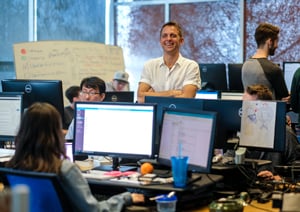The advertising technology sector has taken a bit of a beating over the last several years, but Centerfield’s recent funding and acquisition announcement could preview a rejuvenated deals market for firms that hawk online ad solutions.
The El Segundo company announced last month that it received $156 million in financing from a group of backers led by Miami’s H.I.G. Capital. A portion of that money was spent on acquiring Qology Direct, part of a strategy to supplement Centerfield’s programmatic ad-buying platform with a beefed-up back-end team to close consumer sales on behalf of brands.
The company operates in the performance marketing space. Marketers buy ads on its real-time bidding platform and Centerfield tracks impressions of the ads it places. The firm’s sales team then follows up with individual consumers to try and finalize sales.
“Brands and ad agencies are already using all the services that we provide, they just don’t have one company who can do it all,” said Brett Cravatt, Centerfield’s co-founder and co-president.
Cravatt did not disclose transaction details, though he said the firm has been profitable since it was founded in 2011 and had several hundred million dollars a year in revenue. The company reported 2015 revenue of $74 million to Inc. Magazine. In October 2015, Centerfield reported to the Business Journal that H.I.G. held a 60 percent stake in the company.
The funding stands out in an industry characterized in recent years by declining valuations in the face of stiff competition from major players. The harsh climate has scared away investors.
“The ad tech world has been pretty quiet for a while as far as major deals go,” said Brandon Quartararo, senior vice president of Brentwood’s Intrepid Investment Bankers. “Facebook, Google, and Yahoo control something like 90 percent of the online ad budget, so the rest are fighting for that 10 percent of the pie. They have to scale in order to compete and companies have been struggling to do that.”
Those struggling include some high-profile L.A. companies, including Playa Vista’s Rubicon Project Inc., which went public in 2014 and has had difficulty finding traction in a crowded space. Its share price has tumbled from more than $20 in April of last year to about $8 on Feb. 8 – a decline of 60 percent – sparking rumors of a potential sale.
Part of the issue for Rubicon and others has been shifting client demands, according to Muizz Kheraj, a managing director at West L.A.’s FocalPoint Partners and head of its technology practice.
The biggest change, said Kheraj, is that brands are no longer satisfied by cost-per-thousand and impression-based online marketing – metrics that measure the number of times consumers view an ad and set payment rates accordingly.
“Brands have gotten smarter,” said Kheraj. “Now they’re asking for outcome-related deals instead of activity-related ones. Cost per acquisition is the new standard. (Ad tech firms) only get paid if the consumer actually buys something.”
Combining capabilities
Consolidation has been one of the more popular ways for companies to deal with this new ad tech ecosystem. Businesses have acquired competitors to shore up weak spots and create holistic platforms that handle everything from algorithmic ad buys to direct consumer sales. Quartararo said Fort Mill, S.C.’s Red Ventures has positioned itself as a market leader partly through aggressive M&A moves and others are following its example.
“A lot of investors and groups are trying to cobble together the pieces to compete with Red Ventures,” Quartararo said. “They’ve shown there’s a market for this type of model.”
Centerfield’s play for Qology is an attempt to tap this market demand, according to Cravatt. While many ad tech players offer solutions for specific segments of the online marketing process, he wants to give clients a one-stop ad tech shop, so to speak.
“It’s not necessarily a new model,” he said, “it’s just been a potpourri of companies doing the work.”
The Qology purchase could provide a tremendous boost to Centerfield’s back-end consumer sales capabilities. The Miami firm’s more than 1,200 employees, most of whom occupy a sales role, will push Centerfield’s head count beyond 1,500.
The funding round, which included Falcon Investment Advisors, East West Bank, and Prospect Capital, is the second for H.I.G., which led a $100 million investment round in Centerfield in September 2013. This is the first investment from East West and Prospect in the business. The valuation of Centerfield and the stake taken by the H.I.G. group was not disclosed.
Cravatt said H.I.G. identified Qology as an acquisition target for Centerfield while working on the funding deal and put the acquisition together. Negotiations between the parties began in May, with Houlihan Lokey acting as advisers for Qology.
He acknowledged that more deals could be in the cards for Centerfield, keeping with the industry trend.
“We’re always going to be opportunistic and look for bolt-ons that will help our business,” he said. “Our goal has always been to disrupt the agency model for brands. We’ve won a lot of business doing that already, but we want to further disrupt the industry.”

